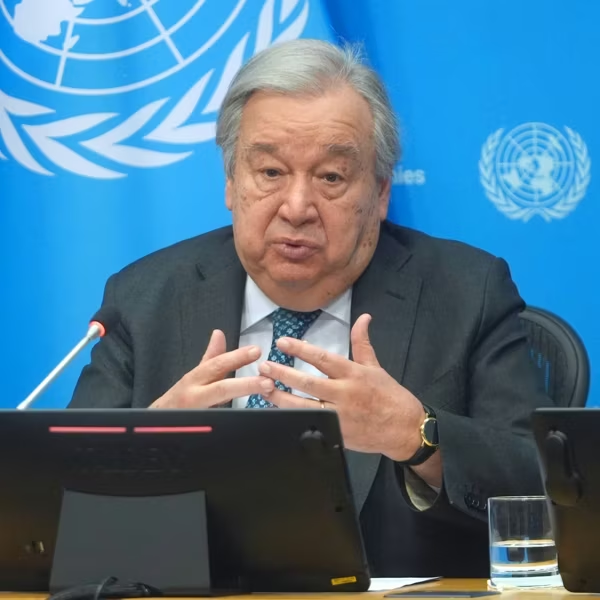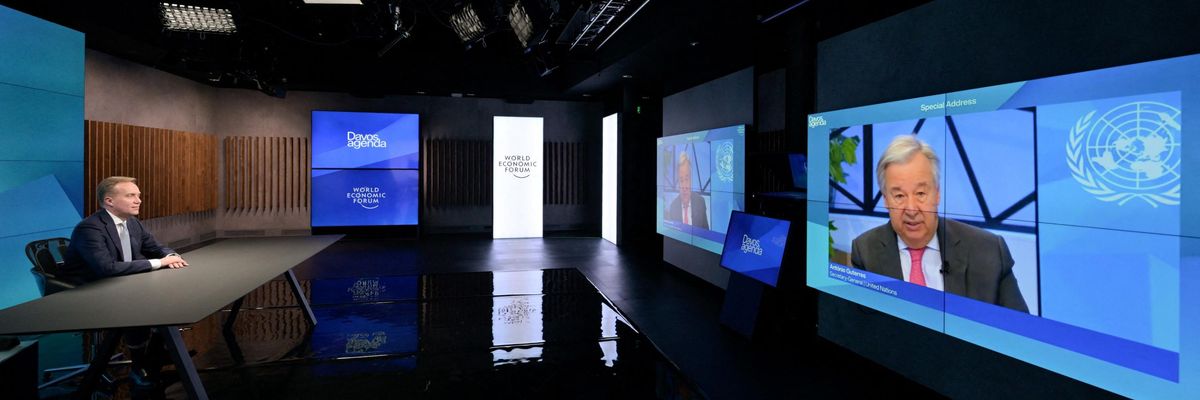During a virtual event to open the notorious annual gathering of the World Economic Forum, United Nations Secretary-General Antonio Guterres on Monday decried not only humanity's poor handling of the coronavirus pandemic but also unequal economic recovery and inadequate climate action.
"Stand with us as we shape a global financial system that works for all countries, not just the wealthy few."
Guterres was one of the primary speakers for the first day of a weeklong event hosted by the World Economic Forum. Though typically held in the Swiss resort town Davos, the meeting's shift to an online format for the second year in a row was announced last month as the Omicron variant drove a surge in Covid-19 cases.
Noting a recent U.N. report that detailed the world's emergence from "the depths of a paralyzing economic crisis," Guterres said that Davos, as the event is often called, "takes place in the shadow of an enormously difficult period for economies, for people, and the planet."
The global recovery, he said, "remains fragile and uneven amid the lingering pandemic, persistent labor market challenges, ongoing supply-chain disruptions, rising inflation, and looming debt traps, not to mention the geopolitical divide."
Urging global solidarity, the U.N. chief warned that "the last two years have demonstrated a simple but brutal truth--if we leave anyone behind, in the end, we leave everyone behind."
According to Guterres:
If we fail to vaccinate every person, we give rise to new variants that spread across borders and bring daily life and economies to a grinding halt.
If we fail to provide debt relief and financing to developing countries, we create a lopsided recovery that can send an interconnected global economy into a tailspin.
If we fail to reduce inequalities, we weigh down economic progress for all people in all countries.
And if we fail to match climate rhetoric with climate actions, we condemn ourselves to a hotter, more volatile Earth, with worsening disasters and mass displacement.
His address follows COP26, a climate summit that wrapped up in November with what activists and other critics blasted as a "hollowed-out" overall deal and a collection of commitments that amounted to "a historically shameful dereliction of duty."
Guterres said Monday that "turning this ship around will take immense willpower and ingenuity from governments and businesses alike, in every major-emitting nation."
The U.N. leader's speech also comes as the global vaccination rate nears a misleading 60% overall, with the percentage of people vaccinated in wealthy nations far exceeding that number while less than 10% of those in low-income countries have received at least one dose.
Meanwhile, certain rich countries continue to block a global waiver of intellectual property rights for Covid-19 vaccines and treatments.
Before the pandemic, the event was an "essential stop on the annual circuit for the global elite, a weeklong schmoozefest where billionaires and autocrats mingle over canapes while activists protest in the frigid mountain air," The New York Times noted Sunday. "'Davos' came to connote not simply the annual meeting of the World Economic Forum itself, but a state of mind," and served as "the spiritual home of the stakeholder capitalism movement."
Guterres appealed directly to the world's business community in his call to build a global financial system that better serves everyone. Low-income countries are "trying to dig themselves out with woefully insufficient national budgets," he said, and the existing system "has failed them when they need it most."
"Countries are shackled by mounting debt and extortionate interest rates--all but guaranteeing defaulted payments," he added. "And many middle-income countries find themselves ineligible for debt relief--despite surging poverty, rising unemployment, and development losses."
"As business leaders," Guterres urged, "stand with us as we shape a global financial system that works for all countries, not just the wealthy few."




